Data structures & algorithms lecture 3
- 1. DATA STRUCTURES AND ALGORITHMS Lecture Notes 3 Prepared by İnanç TAHRALI
- 2. 2 ROAD MAP Abstract Data Types (ADT) The List ADT Implementation of Lists Array implementation of lists Linked list implementation of lists Cursor implementation of lists
- 3. 3 Abstract Data Types (ADT) Definition : Is a set of operation Mathematical abstraction No implementation detail Example : Lists, sets, graphs, stacks are examples of ADT along with their operations
- 4. 4 Why ADT ? Modularity divide program into small functions easy to debug and maintain easy to modify group work Reuse do some operations only once Easy to change of implementation transparent to the program
- 5. 5 THE LIST ADT Ordered sequence of data items called elements A1, A2, A3, …,AN is a list of size N size of an empty list is 0 Ai+1 succeeds Ai Ai-1 preceeds Ai position of Ai is i first element is A1 called “head” last element is AN called “tail” Operations ?
- 6. 6 THE LIST ADT Operations PrintList Find FindKth Insert Delete Next Previous MakeEmpty
- 7. 7 THE LIST ADT Example: the elements of a list are 34, 12, 52, 16, 12 Find (52) 3 Insert (20, 3) 34, 12, 52, 20, 16, 12 Delete (52) 34, 12, 20, 16, 12 FindKth (3) 20
- 8. 8 Implementation of Lists Many Implementations Array Linked List Cursor (linked list using arrays)
- 9. 9 ROAD MAP Abstract Data Types (ADT) The List ADT Implementation of Lists Array implementation of lists Linked list implementation of lists Cursor implementation of lists
- 10. 10 Array Implementation of List ADT Need to define a size for array High overestimate (waste of space) Operations Running Times PrintList O(N) Find Insert O(N) (on avarage half needs to be moved) Delete FindKth Next O(1) Previous
- 11. 11 Array Implementation of List ADT Disadvantages : insertion and deletion is very slow need to move elements of the list redundant memory space it is difficult to estimate the size of array
- 12. 12 ROAD MAP Abstract Data Types (ADT) The List ADT Implementation of Lists Array implementation of lists Linked list implementation of lists Cursor implementation of lists
- 13. 13 Linked List Implementation of Lists Series of nodes not adjacent in memory contain the element and a pointer to a node containing its succesor Avoids the linear cost of insertion and deletion !
- 14. 14 Linked List Implementation of Lists Insertion into a linked list
- 15. 15 Linked List Implementation of Lists Deletion from a linked list
- 16. 16 Linked List Implementation of Lists Need to know where the first node is the rest of the nodes can be accessed No need to move the list for insertion and deletion operations No memory waste
- 17. 17 Linked List Implementation of Lists Linked List Array PrintList O(N) (traverse the list) O(N) Find FindKth (L,i) O(i) O(1) Delete O(1) O(N)
- 18. 18 Programming Details There are 3 special cases for linked lists Insert an element at the front of the list there is no really obvious way Delete an element from the front of the list changes the start of the list Delete an element in general requires to keep track of the node before the deleted one How can we solve these three problems ?
- 19. 19 Programming Details Keep a header node in position 0 Write a FindPrevious routine returns the predecessor of the cell To delete the first element FindPrevious routine returns the position of header Use of header node is controversial !
- 20. 20 Type decleration for link list node template <class Object> class List; // Incomplete declaration. template <class Object> class ListItr; // Incomplete declaration. template <class Object> class ListNode { ListNode( const Object & theElement = Object( ), ListNode*n=NULL) : element(theElement),next(n) {} Object element; ListNode *next; friend class List<Object>; friend class ListItr<Object>; };
- 21. 21 Iterator class for linked lists template <class Object> class ListItr { public: ListItr( ) : current( NULL ) { } bool isPastEnd( ) const { return current == NULL; } void advance( ) { if( !isPastEnd( ) ) current = current->next; } const Object & retrieve( ) const { if( isPastEnd( ) ) throw BadIterator( ); return current->element; } private: ListNode<Object> *current; // Current position ListItr(ListNode<Object> *theNode):current( theNode ) { } friend class List<Object>; // Grant access to constructor };
- 22. 22 List class interface template <class Object> class List { public: List( ); List( const List & rhs ); ~List( ); bool isEmpty( ) const; void makeEmpty( ); ListItr<Object> zeroth( ) const; ListItr<Object> first( ) const; void insert( const Object & x, const ListItr<Object> & p ); ListItr<Object> find( const Object & x ) const; ListItr<Object> findPrevious( const Object & x ) const; void remove( const Object & x ); const List & operator=( const List & rhs ); private: ListNode<Object> *header; };
- 23. 23 Function to print a list template <class Object> void printList( const List<Object> &the List) { if (theList.isEmpty()) cout<< “Empty list” << endl; else { ListItr<Object> itr = theList.first(); for (; !itr.isPastEnd(); itr.advance()) cout << itr.retrieve() <<“ ”; } cout << endl; }
- 24. 24 Some list one-liners /* Construct the list */ template <class Object> List<Object>::List( ) { header = new ListNode<Object>; } /* Test if the list is logically empty */ template <class Object> bool List<Object>::isEmpty( ) const { return header->next == NULL; }
- 25. 25 Some list one liners /* Return an iterator representing the header node template <class Object> ListItr<Object> List<Object>::zeroth( ) const { return ListItr<Object>( header ); } /* Return an iterator representing the first node in the list. This operation is valid for empty lists. */ template <class Object> ListItr<Object> List<Object>::first( ) const { return ListItr<Object>( header->next ); }
- 26. 26 Find routine /* Return iterator corresponding to the first node containing an item x. Iterator isPastEnd if item is not found. */ template <class Object> ListItr<Object> List<Object>::find( const Object & x ) const { ListNode<Object> *itr = header->next; while( itr != NULL && itr->element != x ) itr = itr->next; return ListItr<Object>( itr ); }
- 27. 27 Deletion routine for linked lists /* Remove the first occurrence of an item x. */ template <class Object> void List<Object>::remove( const Object & x ) { ListItr<Object> p = findPrevious( x ); if( p.current->next != NULL ) { ListNode<Object> *oldNode = p.current->next; p.current->next = p.current->next->next; delete oldNode; } }
- 28. 28 findPrevious-the find routine for use with remove /*Return iterator prior to the first node containing an item x. template <class Object> ListItr<Object> List<Object>::findPrevious( const Object & x ) const { ListNode<Object> *itr = header; while( itr->next != NULL && itr->next->element != x ) itr = itr->next; return ListItr<Object>( itr ); }
- 29. 29 Insertion routine for linked lists /* Insert item x after p. */ template <class Object> void List<Object>::insert( const Object & x, const ListItr<Object> & p ) { if( p.current != NULL ) p.current->next = new ListNode<Object> ( x, p.current->next ); }
- 30. 30 makeEmpty and List destructor /* Make the list logically empty. */ template <class Object> void List<Object>::makeEmpty( ) { while( !isEmpty( ) ) remove( first( ).retrieve( ) ); } /* Destructor */ template <class Object> List<Object>::~List( ) { makeEmpty( ); delete header; }
- 31. 31 List copy routines: operator= /*Deep copy of linked lists. template <class Object> const List<Object> & List<Object>::operator=( const List<Object> & rhs ) { ListItr<Object> ritr = rhs.first( ); ListItr<Object> itr = zeroth( ); if( this != &rhs ) { makeEmpty( ); for( ; !ritr.isPastEnd( ); ritr.advance( ),itr.advance( )) insert( ritr.retrieve( ), itr ); } return *this; }
- 32. 32 List copy routines : copy constructor /* Copy constructor template <class Object> List<Object>::List( const List<Object> & rhs ) { header = new ListNode<Object>; *this = rhs; }
- 33. 33 Doubly Linked List Traversing list backwards not easy with regular lists Insertion and deletion more pointer fixing Deletion is easier Previous node is easy to find
- 34. 34 Circulary Linked List Last node points the first
- 35. 35 ROAD MAP Abstract Data Types (ADT) The List ADT Implementation of Lists Array implementation of lists Linked list implementation of lists Cursor implementation of lists
- 36. 36 Cursor Implementation of Linked List Problems with linked list implementation: Same language do not support pointers ! Then how can you use linked lists ? new and free operations are slow Actually not constant time
- 37. 37 Cursor Implementation of Linked List SOLUTION: Implement linked list on an array called CURSOR
- 38. 38 Cursor Implementation of Linked List Cursor operation simulates the features Collection of structures uses array for nodes Array index is pointer new and delete operation Keep a free list new returns an element from freelist delete place the node in freelist Freelist Use cell 0 as header All nodes are free initially 0 is a NULL pointer
- 39. 39 Cursor Implementation of Linked List If L = 5, then L represents list (A, B, E) If M = 3, then M represents list (C, D, F)
- 40. 40 Iterator for cursor implementation of linked lists template <class Object> class ListItr { public: ListItr( ) : current( 0 ) { } bool isPastEnd( ) const {return current == 0; } void advance( ){ if( !isPastEnd( ) ) current = List<Object>::cursorSpace[ current ].next; } const Object & retrieve( ) const { if( isPastEnd( ) ) throw BadIterator( ); return List<Object>::cursorSpace[ current ].element; } private: int current; // Current position friend class List<Object>; ListItr( int theNode ) : current( theNode ) { } };
- 41. 41 Class skeleton for cursor-based List template <class Object> class ListItr; // Incomplete declaration. template <class Object> class List { public: List( ); List( const List & rhs ); ~List( ); bool isEmpty( ) const; void makeEmpty( ); ListItr<Object> zeroth( ) const; ListItr<Object> first( ) const; void insert( const Object & x, const ListItr<Object> & p ); ListItr<Object> find( const Object & x ) const; ListItr<Object> findPrevious( const Object & x ) const; void remove( const Object & x );
- 42. 42 Class skeleton for cursor-based List public: struct CursorNode { CursorNode( ) : next( 0 ) { } private: CursorNode( const Object & theElement, int n ) : element( theElement ), next( n ) {} Object element; int next; friend class List<Object>; friend class ListItr<Object>; }; const List & operator=( const List & rhs );
- 43. 43 Class skeleton for cursor-based List private: int header; static vector<CursorNode> cursorSpace; static void initializeCursorSpace( ); static int alloc( ); static void free( int p ); friend class ListItr<Object>; };
- 44. 44 cursorSpace initialization /* Routine to initialize the cursorSpace. */ template <class Object> void List<Object>::initializeCursorSpace( ) { static int cursorSpaceIsInitialized = false; if( !cursorSpaceIsInitialized ) { cursorSpace.resize( 100 ); for( int i = 0; i < cursorSpace.size( ); i++ ) cursorSpace[ i ].next = i + 1; cursorSpace[ cursorSpace.size( ) - 1 ].next = 0; cursorSpaceIsInitialized = true; } }
- 45. 45 Routines : alloc and free /* Allocate a CursorNode template <class Object> int List<Object>::alloc( ) { int p = cursorSpace[ 0 ].next; cursorSpace[ 0 ].next = cursorSpace[ p ].next; return p; } /* Free a CursorNode template <class Object> void List<Object>::free( int p ) { cursorSpace[ p ].next = cursorSpace[ 0 ].next; cursorSpace[ 0 ].next = p; }
- 46. 46 Short routines for cursor-based lists /* Construct the list template <class Object> List<Object>::List( ) { initializeCursorSpace( ); header = alloc( ); cursorSpace[ header ].next = 0; } /* Destroy the list template <class Object> List<Object>::~List( ) { makeEmpty( ); free( header ); }
- 47. 47 Short routines for cursor-based lists /* Test if the list is logically empty. return true if empty template <class Object> bool List<Object>::isEmpty( ) const { return cursorSpace[ header ].next == 0; } /* Return an iterator representing the first node in the list. This operation is valid for empty lists. template <class Object> ListItr<Object> List<Object>::first( ) const { return ListItr<Object>( cursorSpace[ header ].next ); }
- 48. 48 find routine - cursor implementation /*Return iterator corresponding to the first node containing an item x. Iterator isPastEnd if item is not found. template <class Object> ListItr<Object> List<Object>::find( const Object & x ) const { int itr = cursorSpace[ header ].next; while( itr != 0 && cursorSpace[ itr ].element != x ) itr = cursorSpace[ itr ].next; return ListItr<Object>( itr ); }
- 49. 49 insertion routine-cursor implementation /* Insert item x after p. template <class Object> void List<Object>::insert(const Object & x,const ListItr<Object> & p) { if( p.current != 0 ) { int pos = p.current; int tmp = alloc( ); cursorSpace[ tmp ] = CursorNode( x, cursorSpace[ pos ].next ); cursorSpace[ pos ].next = tmp; } }
- 50. 50 deletion routine - cursor implementation /* Remove the first occurrence of an item x. template <class Object> void List<Object>::remove( const Object & x ) { ListItr<Object> p = findPrevious( x ); int pos = p.current; if( cursorSpace[ pos ].next != 0 ) { int tmp = cursorSpace[ pos ].next; cursorSpace[ pos ].next = cursorSpace[ tmp ].next; free ( tmp ); } }








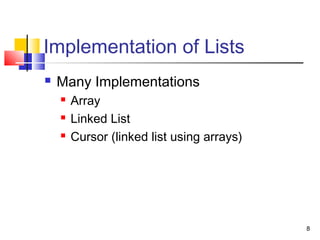
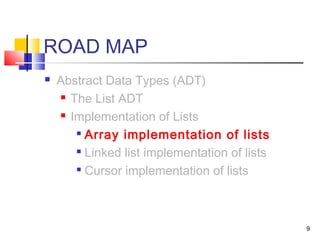






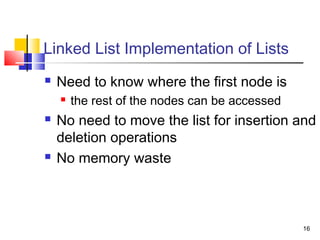



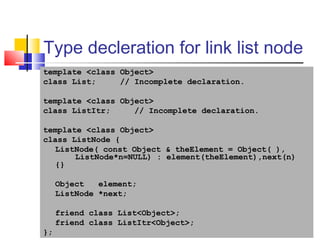


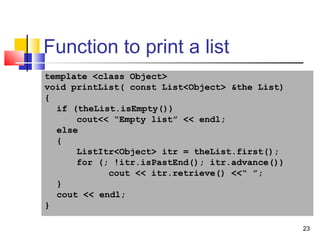

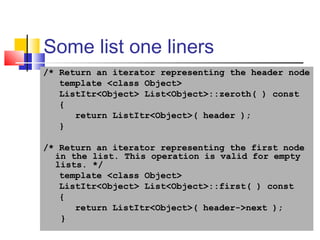


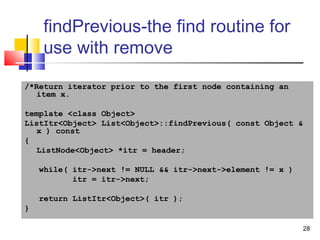


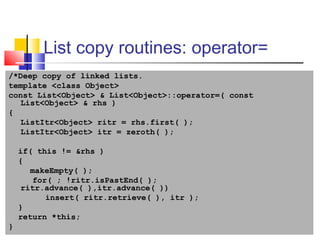








![40
Iterator for cursor implementation
of linked lists
template <class Object>
class ListItr
{
public:
ListItr( ) : current( 0 ) { }
bool isPastEnd( ) const {return current == 0; }
void advance( ){
if( !isPastEnd( ) )
current = List<Object>::cursorSpace[ current ].next; }
const Object & retrieve( ) const {
if( isPastEnd( ) ) throw BadIterator( );
return List<Object>::cursorSpace[ current ].element; }
private:
int current; // Current position
friend class List<Object>;
ListItr( int theNode ) : current( theNode ) { }
};](https://image.slidesharecdn.com/datastructuresalgorithmslecture3-130705091650-phpapp02/85/Data-structures-algorithms-lecture-3-40-320.jpg)

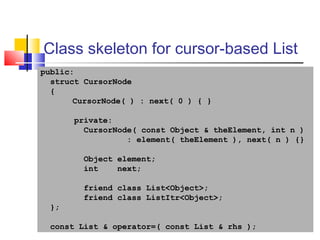

![44
cursorSpace initialization
/* Routine to initialize the cursorSpace. */
template <class Object>
void List<Object>::initializeCursorSpace( )
{
static int cursorSpaceIsInitialized = false;
if( !cursorSpaceIsInitialized )
{
cursorSpace.resize( 100 );
for( int i = 0; i < cursorSpace.size( ); i++ )
cursorSpace[ i ].next = i + 1;
cursorSpace[ cursorSpace.size( ) - 1 ].next = 0;
cursorSpaceIsInitialized = true;
}
}](https://image.slidesharecdn.com/datastructuresalgorithmslecture3-130705091650-phpapp02/85/Data-structures-algorithms-lecture-3-44-320.jpg)
![45
Routines : alloc and free
/* Allocate a CursorNode
template <class Object>
int List<Object>::alloc( )
{
int p = cursorSpace[ 0 ].next;
cursorSpace[ 0 ].next = cursorSpace[ p ].next;
return p;
}
/* Free a CursorNode
template <class Object>
void List<Object>::free( int p )
{
cursorSpace[ p ].next = cursorSpace[ 0 ].next;
cursorSpace[ 0 ].next = p;
}](https://image.slidesharecdn.com/datastructuresalgorithmslecture3-130705091650-phpapp02/85/Data-structures-algorithms-lecture-3-45-320.jpg)
![46
Short routines for cursor-based lists
/* Construct the list
template <class Object>
List<Object>::List( )
{
initializeCursorSpace( );
header = alloc( );
cursorSpace[ header ].next = 0;
}
/* Destroy the list
template <class Object>
List<Object>::~List( )
{
makeEmpty( );
free( header );
}](https://image.slidesharecdn.com/datastructuresalgorithmslecture3-130705091650-phpapp02/85/Data-structures-algorithms-lecture-3-46-320.jpg)
![47
Short routines for cursor-based lists
/* Test if the list is logically empty. return true if
empty
template <class Object>
bool List<Object>::isEmpty( ) const
{
return cursorSpace[ header ].next == 0;
}
/* Return an iterator representing the first node in
the list. This operation is valid for empty lists.
template <class Object>
ListItr<Object> List<Object>::first( ) const
{
return ListItr<Object>( cursorSpace[ header ].next );
}](https://image.slidesharecdn.com/datastructuresalgorithmslecture3-130705091650-phpapp02/85/Data-structures-algorithms-lecture-3-47-320.jpg)
![48
find routine - cursor implementation
/*Return iterator corresponding to the first node containing
an item x. Iterator isPastEnd if item is not found.
template <class Object>
ListItr<Object> List<Object>::find( const Object & x ) const
{
int itr = cursorSpace[ header ].next;
while( itr != 0 && cursorSpace[ itr ].element != x )
itr = cursorSpace[ itr ].next;
return ListItr<Object>( itr );
}](https://image.slidesharecdn.com/datastructuresalgorithmslecture3-130705091650-phpapp02/85/Data-structures-algorithms-lecture-3-48-320.jpg)
![49
insertion routine-cursor implementation
/* Insert item x after p.
template <class Object>
void List<Object>::insert(const Object & x,const ListItr<Object> & p)
{
if( p.current != 0 )
{
int pos = p.current;
int tmp = alloc( );
cursorSpace[ tmp ] = CursorNode( x, cursorSpace[ pos ].next );
cursorSpace[ pos ].next = tmp;
}
}](https://image.slidesharecdn.com/datastructuresalgorithmslecture3-130705091650-phpapp02/85/Data-structures-algorithms-lecture-3-49-320.jpg)
![50
deletion routine - cursor implementation
/* Remove the first occurrence of an item x.
template <class Object>
void List<Object>::remove( const Object & x )
{
ListItr<Object> p = findPrevious( x );
int pos = p.current;
if( cursorSpace[ pos ].next != 0 )
{
int tmp = cursorSpace[ pos ].next;
cursorSpace[ pos ].next = cursorSpace[ tmp ].next;
free ( tmp );
}
}](https://image.slidesharecdn.com/datastructuresalgorithmslecture3-130705091650-phpapp02/85/Data-structures-algorithms-lecture-3-50-320.jpg)